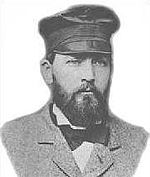Januarius MacGahan
| Januarius MacGahan | |
|---|---|
 |
|
| Born |
June 12, 1844 New Lexington, Ohio, United States |
| Died | June 9, 1878 (aged 33) Istanbul, Ottoman Empire |
| Occupation | Journalist |
| Nationality | American |
| Genre | War correspondent |
| Notable works | Covered the Franco-Prussian War, Uprising of French Commune, Bulgarian Massacres of 1876, Russian-Turkish War of 1877–78 |
Januarius Aloysius MacGahan [məˈɡæn] (June 12, 1844 – June 9, 1878) was an American journalist and war correspondent working for the New York Herald and the London Daily News. His articles describing the massacre of Bulgarian civilians by Turkish soldiers and irregular volunteers in 1876 created public outrage in Europe, and were a major factor in preventing Britain from supporting Turkey in the Russo–Turkish War of 1877–78, which led to Bulgaria gaining independence from the Ottoman Empire.
Januarius Aloysius MacGahan was born near New Lexington, Ohio on June 12, 1844. His father was an immigrant from Ireland who had served on the Northumberland, the ship which took Napoleon into exile on St. Helena. MacGahan moved to St. Louis, where he worked briefly as a teacher and as a journalist. There he met his cousin, General Philip Sheridan, a Civil War hero also of Irish parentage, who convinced him to study law in Europe. He sailed to Brussels in December 1868.
MacGahan did not get a law degree, but he discovered that he had a gift for languages, learning French and German. He ran short of money and was about to return to America in 1870 when the Franco-Prussian War broke out. Sheridan happened to be an observer with the German Army, and he used his influence to persuade the European editor of the New York Herald to hire MacGahan as a war correspondent with the French Army.
MacGahan's vivid articles from the front lines describing the stunning defeat of the French Army won him a large following, and many of his dispatches to the Herald were reprinted by European newspapers. By the age of twenty-seven, he was a celebrity. When the war ended, he interviewed French leader Léon Gambetta and Victor Hugo, and, in March 1871, he hurried to Paris and was one of the first foreign correspondents to report on the uprising of the Paris Commune. He was arrested by the French military and nearly executed, and was only rescued through the intervention of the U.S. Minister to France.
...
Wikipedia
